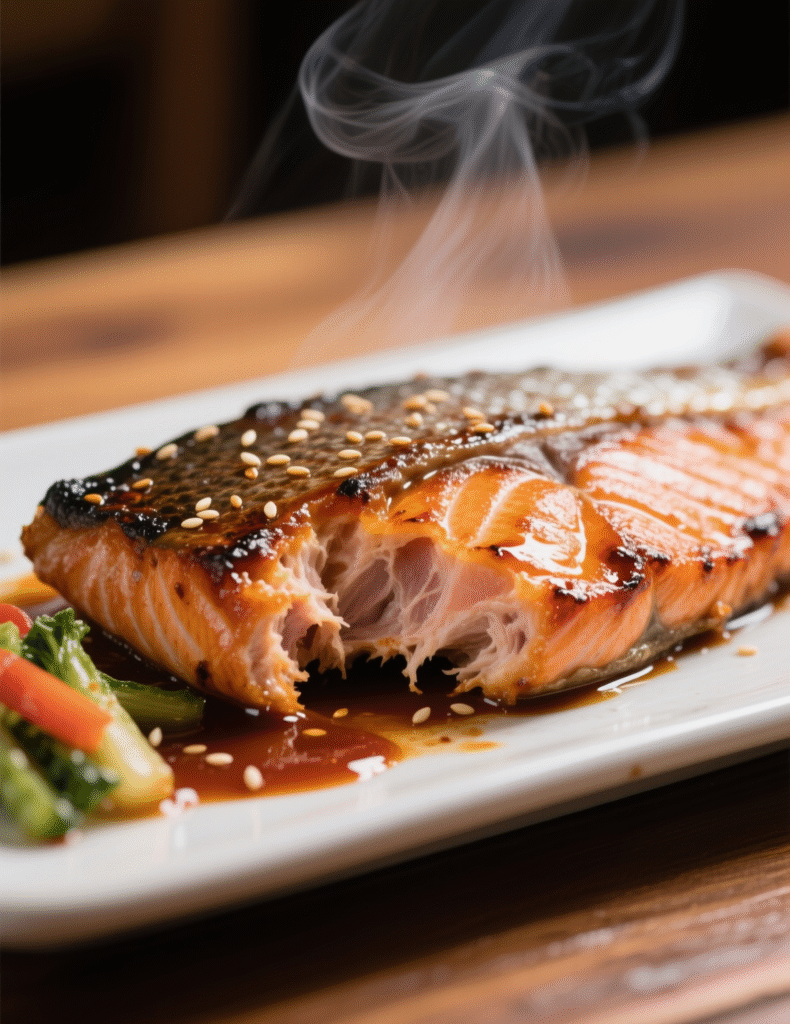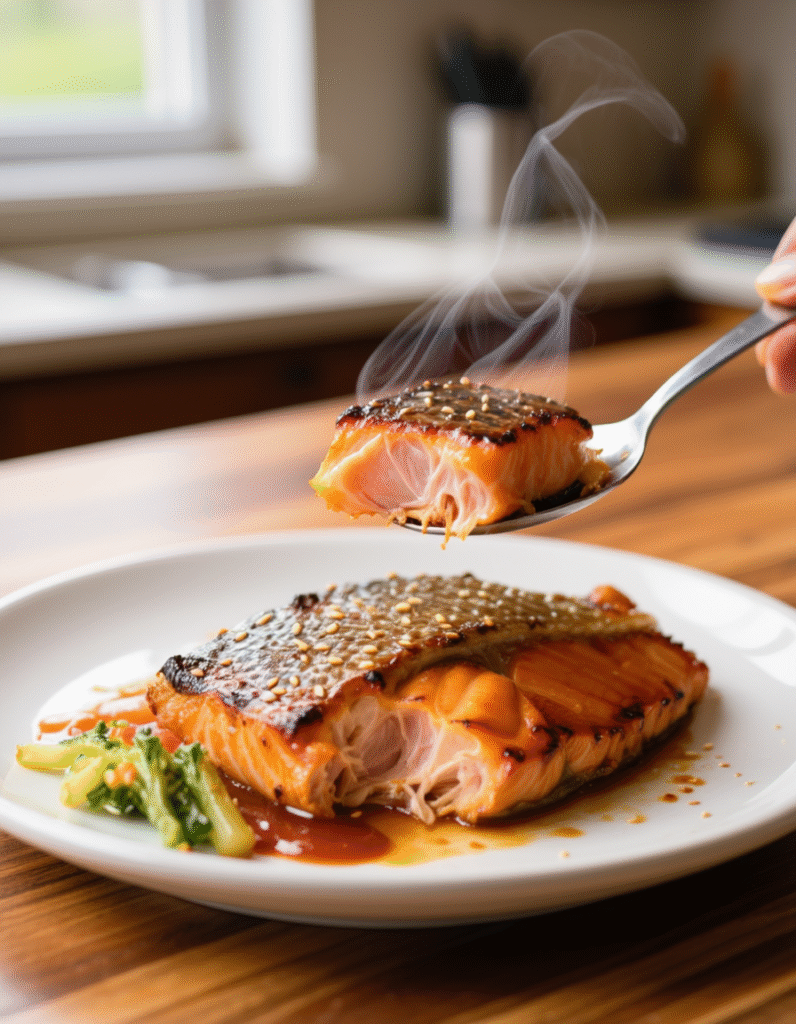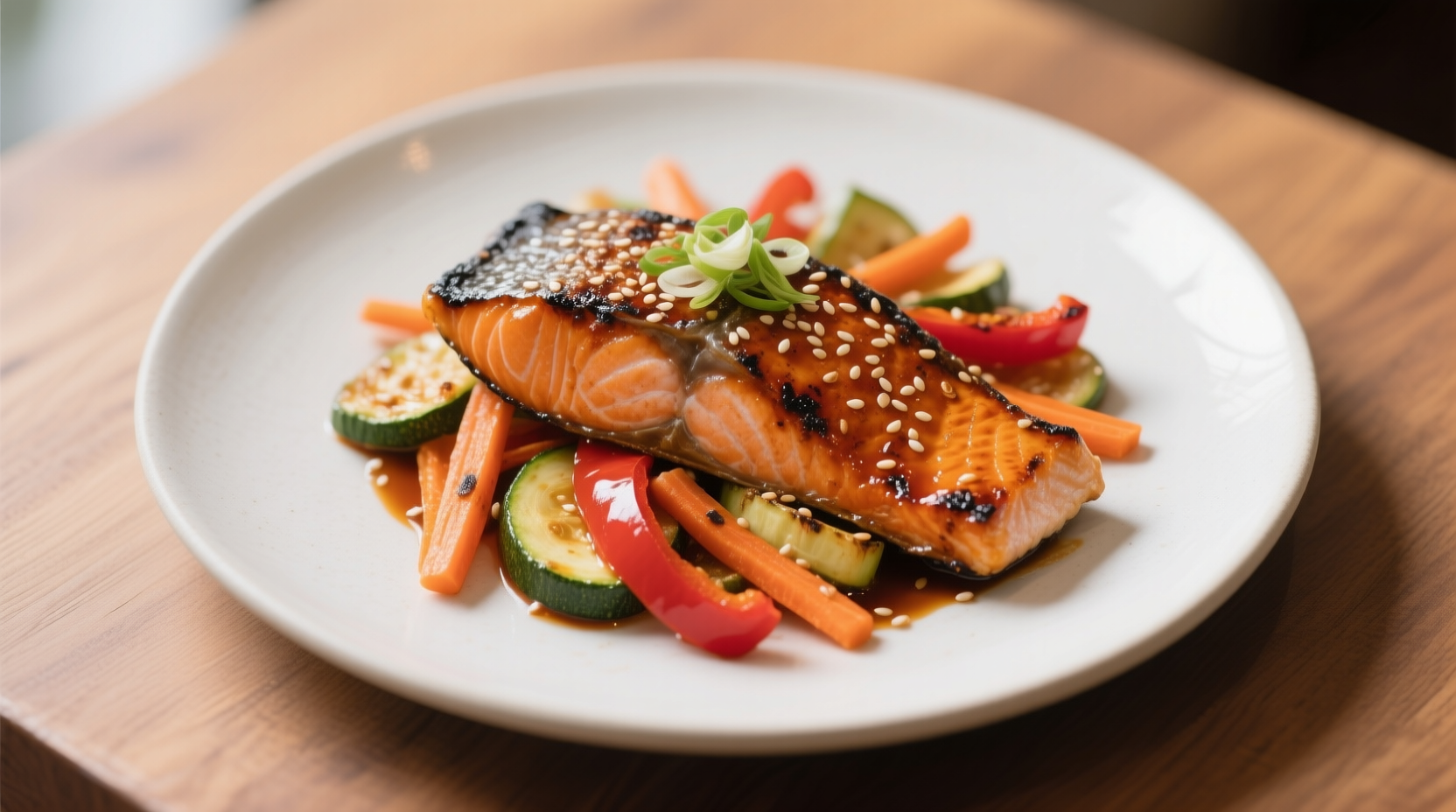Every so often, a recipe comes along that feels like it was waiting to be born. Korean-style bulgogi grilled salmon is one of those dishes. It’s a marriage of old and new—ancient Korean flavors hugging the silky flesh of salmon, cooked with a char that whispers smoke and sweetness at once. If you’ve ever wondered how to take salmon out of the plain lemon-and-dill rut, this dish is a masterclass in what’s possible.
Why Bulgogi Meets Salmon
Traditional bulgogi is thinly sliced beef marinated in soy, garlic, sugar, and sesame. Its taste is equal parts sweet, savory, and umami-rich. Now, put those same flavors on salmon, and you suddenly have something that feels bold and delicate at once.
The reason it works is chemistry. Salmon has a high fat content, and fat loves sugar and soy. When grilled, the sugars caramelize, while the miso-like notes of soy and sesame soak deep into the fish. A study from the Korean Food Research Institute noted that soy-based marinades can reduce oxidative rancidity in fish oils, meaning your salmon not only tastes better but keeps fresher longer.
Chefs in Seoul have already been playing with this twist for years in modern restaurants. It’s creeping into the West now, especially in fusion-forward cities like Los Angeles and Vancouver.
Selecting the Right Salmon
Not all salmon cooks the same. Wild sockeye has punchy flavor and firm flesh, but it’s leaner than Atlantic farmed salmon. For grilling with a sugar-rich marinade, fattier cuts hold up better. Farmed Atlantic or King (Chinook) salmon, with their buttery fat layers, give the best texture.
If you’re sourcing from markets, ask for skin-on fillets. Skin acts like a protective shield when grilling, preventing sticking and locking in moisture. Professionals know: skin on salmon is not decoration—it’s strategy.
Building the Bulgogi Marinade
At its core, bulgogi marinade is a balance of salty, sweet, aromatic, and nutty. For salmon, you have to tweak it. Too much soy and it drowns the fish. Too little sugar and you miss caramelization.
Here’s a tested ratio:
- 3 tbsp soy sauce (fermented Korean soy if possible)
- 1.5 tbsp brown sugar or Korean pear juice (pear tenderizes too, thanks to its natural enzymes)
- 1 tbsp rice wine (mirin works)
- 2 tsp sesame oil
- 2 cloves garlic, grated fine
- 1 tsp ginger, minced
- 1 small scallion, finely chopped
- 1 tsp gochujang (optional, adds gentle heat)
Mix this and taste. It should feel sweet first, then salty, then a lingering nuttiness. Some chefs sneak in a splash of Coca-Cola—yes, you heard right—as a sugar-acid balance. I wouldn’t laugh at it; it works.

The Marinade Technique
Fish doesn’t need hours like beef. In fact, leave salmon in this marinade too long, and it turns mushy. Thirty minutes to an hour is ideal. Professionals often pat the fish dry before laying it in the mix, ensuring the liquid clings better.
Use a shallow glass tray, not a metal one, since acidity reacts with metal. Cover lightly, refrigerate, but don’t forget it—time is everything here.
One clever trick: reserve a few tablespoons of marinade before adding fish. Later, brush it on as a glaze while grilling. That double-layered flavor is where the magic lies.
Grilling for the Perfect Char
Grilling salmon isn’t just “throw it on and wait.” It’s heat control and surface contact. High heat gives you caramelization, but too much burns sugars. Medium-high is safer.
Brush the grill with oil first. Place salmon skin side down, close the lid, and resist moving it. Salmon flesh tears easily when flipped too soon. A 1-inch thick fillet takes about 4-5 minutes per side, depending on heat.
The goal: skin crisp, flesh still moist, center just a hint translucent. If you’re using charcoal, add a small wood chunk—applewood pairs beautifully with bulgogi notes.
Why This Works Nutritionally
Grilled salmon already carries heart-healthy omega-3 fatty acids. Bulgogi marinade enhances this by reducing the perception of fishiness, something many people shy from. In sensory studies, sweet-savory profiles make fatty fish more palatable to wider audiences.
The sesame oil adds lignans and antioxidants. Garlic and ginger bring anti-inflammatory properties. This isn’t just indulgent eating; it’s functional food with flavor.
Professional Insights and Variations
Some chefs baste salmon with honey in the last minute of grilling, giving a lacquered finish that photographs beautifully. Others sprinkle toasted sesame seeds and micro-shiso leaves before serving. Presentation matters.
For restaurants, pre-marinated salmon fillets can sit for up to 8 hours if vacuum-sealed and refrigerated. The pear juice enzymes tenderize gently but won’t break down the flesh as aggressively when sealed.
In home kitchens, you can adapt the grill method with a cast-iron pan. Heat until smoking, lay salmon skin-down, and finish under a broiler to mimic the char.
Pairings and Serving Ideas
This dish isn’t just a main—it dictates the whole plate. Serve with a bed of warm short-grain rice. Add kimchi for crunch and acidity. A side of blanched spinach tossed in sesame oil (sigeumchi namul) balances richness.
If you’re plating for fine dining, slice salmon into thick medallions after grilling, fanning them across the plate with a brush of reduced marinade as sauce. Professionals love vertical height, so pile rice in a small mold and perch salmon pieces artfully around it.
Beverage pairing? A chilled soju works wonders. If wine is your thing, a lightly chilled Pinot Noir or even a dry Riesling lifts the sweet-salty profile.

Common Mistakes to Avoid
One mistake: over-marinating. The enzymes in pear juice or pineapple can mush salmon in under two hours. Another mistake: cooking straight from fridge. Cold fish seizes on the grill and cooks unevenly. Always let it rest at room temp for 10–15 minutes.
Also, don’t drown the grill with glaze. Sugars burn quick. Thin layers, brushed in stages, give a shine without charred bitterness.
A Look at the Bigger Culinary Trend
Fusion dishes like this are not fads—they’re the future of cuisine. Korean flavors have been climbing global popularity charts for the last decade. Market research in 2023 showed Korean sauces in the US grew by 23% in retail sales year-over-year. Salmon is the second most consumed fish in America. Put them together, and you have a commercial winner.
Restaurants adopting these fusions see younger diners respond the most, particularly Gen Z, who prize bold flavors and multicultural blends. That means Korean-style bulgogi grilled salmon isn’t just delicious—it’s a smart menu move.
Final Thoughts
Korean-style bulgogi grilled salmon takes what we know about beef, twists it, and brings fire-kissed elegance to seafood. The marinade works with, not against, salmon’s fatty richness. The grill brings the crackle and smoke. Together, they give you a dish that feels both deeply traditional and boldly modern.
For professionals, the recipe offers flexibility—fast prep, simple ingredients, and big payoff in flavor. For home cooks, it’s a gateway into Korean culinary thinking, without the intimidation of specialty cuts of meat.
Cook it once, and you’ll wonder why salmon was ever stuck with just lemon slices.
FAQs
What is Korean-style bulgogi grilled salmon?
It’s salmon marinated in a sweet-savory Korean bulgogi sauce, then grilled for a smoky, caramelized flavor.
How long should I marinate the salmon?
About 30 minutes to 1 hour is enough, longer can make the fish mushy.
Can I use frozen salmon for this recipe?
Yes, but thaw it completely and pat dry before marinating.
What type of salmon is best for grilling?
Fatty cuts like Atlantic or King salmon hold up best on the grill.
Do I need Korean pear juice for the marinade?
It helps tenderize and sweeten, but apple juice or brown sugar also works.
Can I cook this without a grill?
Yes, a hot cast-iron skillet or oven broiler can mimic the grilled effect.
Should the salmon skin be left on?
Yes, it protects the flesh from sticking and keeps it moist.
What side dishes pair well with this recipe?
Steamed rice, kimchi, and sesame spinach are classic pairings.
How do I stop the marinade from burning?
Brush it on in thin layers toward the end of grilling.
Is this dish healthy?
Yes, it’s rich in omega-3s, antioxidants, and balanced nutrients from the marinade.

Mariana is a passionate home cook who creates delicious, easy-to-follow recipes for busy people. From energizing breakfasts to satisfying dinners and indulgent desserts, her dishes are designed to fuel both your body and hustle.
When she’s not in the kitchen, she’s exploring new flavors and dreaming up her next recipe to share with the Foodie Hustle community.

